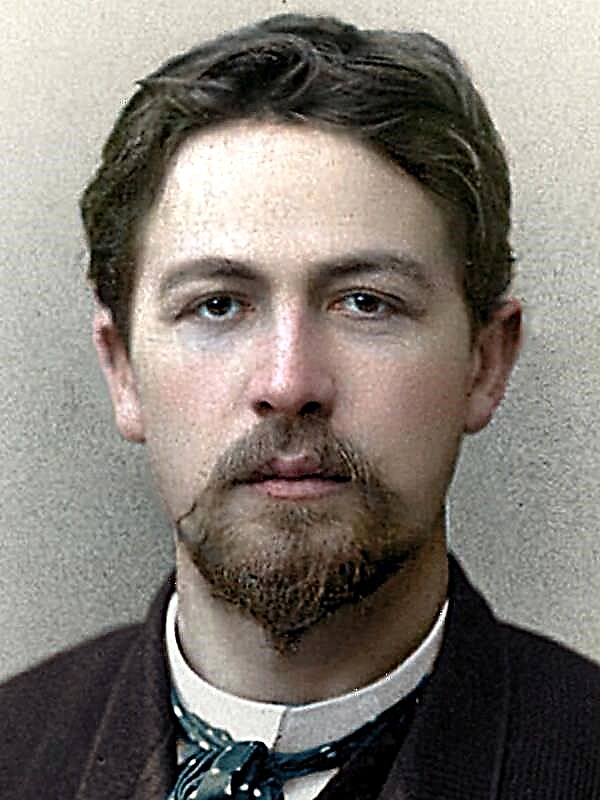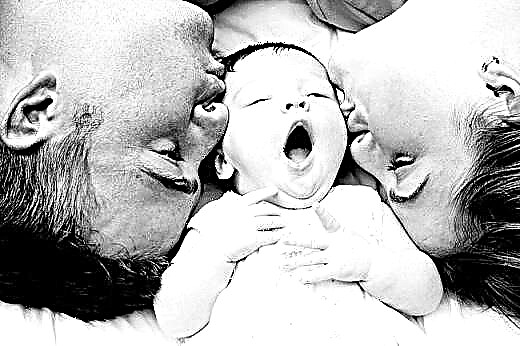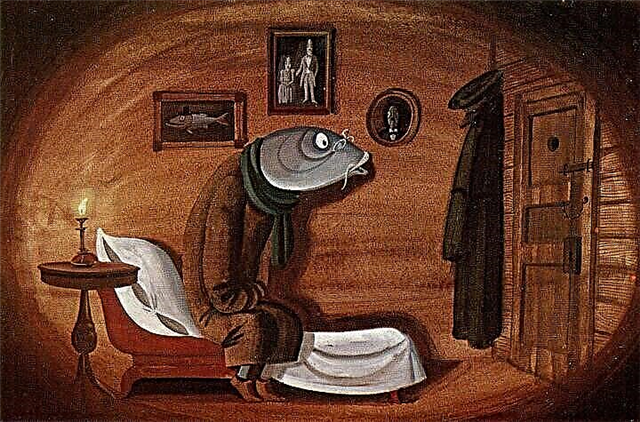The young doctor Charles Bovary first saw Emma Rouault when he was summoned to the farm of her father, who broke his leg. Emma wore a blue woolen dress with three ruffles. Her hair was black, smoothly combed in front on a parting, her cheeks were pink, the look of her large black eyes was straight and open. Charles by this time was already married to the ugly and quarrelsome widow, whom his mother conceived because of the dowry. Dad Rouault’s turning point was easy, but Charles continued to ride the farm. Jealous wife found that Mademoiselle Rouault studied at the ursulinok monastery, that she “dances, knows geography, draws, embroiders and strumming the piano. No, that's too much! ” She plagued her husband in abeyance.
However, soon Charles’s wife died unexpectedly. And after a while he married Emma. The mother-in-law reacted coldly to the new daughter-in-law. Emma became Madame Bovary and moved to Charles's house in the town of Toast. She turned out to be a wonderful hostess. Charles idolized his wife. "The whole world was locked for him within the silky girth of her dresses." When after work he sat at the threshold of the house in shoes embroidered by Emma, he felt at the top of bliss. Emma, unlike him, was full of confusion. Before the wedding, she believed that “the wondrous feeling that she still imagined as a bird of paradise <...> finally flew to her”, but happiness did not come, and she decided that she was mistaken. In the monastery, she became addicted to reading novels; she wanted, like her beloved heroines, to live in an old castle and wait for a faithful knight. She grew up with a dream of strong and beautiful passions, and reality in the outback was so prosaic! Charles was devoted to her, kind and hardworking, but there was not even a shadow of the heroic in him. His speech "was flat, like a panel, along which a string of other people's thoughts in their everyday clothes <...> He taught nothing, knew nothing, did not want anything."
Once, something unusual invaded her life. Bovary received an invitation to a ball at the Marquise's ancestral castle, to which Charles successfully removed an abscess in his throat. Magnificent halls, distinguished guests, exquisite dishes, the smell of flowers, delicate linen and truffles - in this atmosphere Emma experienced an acute bliss. It was especially exciting to her that among the secular crowd she could distinguish between currents of forbidden connections and reprehensible pleasures. She waltzed with a real viscount, who then left for Paris itself! After dancing, her satin slippers turned yellow from waxed parquet. “The same thing happened to her heart as to the shoes: something indelible remained on him from a touch of luxury ...” No matter how Emma hoped for a new invitation, he did not follow. Now life in Toast was completely disgusting to her. "The future seemed to her a dark corridor, abutting against a tightly locked door." Longing took the form of a disease, Emma was tormented by asthma attacks, palpitations, she developed a dry cough, her excitement gave way to apathy. Alarmed, Charles explained her condition by the climate and began to look for a new place.
In the spring, the Bovary couple moved to the town of Ionville near Rouen. Emma was already expecting a baby.
It was a land where "the dialect is devoid of character, and the landscape is original." At the same hour, the miserable stagecoach “Swallow” stopped in the central square, and his coachman handed out packages of purchases to the residents. At the same time, the whole city was making jam, stocking up for a year ahead. Everyone knew everything and gossiped about everything and everything. Bovary were introduced into the local society. He included a pharmacist, Mr. Ome, whose face “did not express anything but narcissism,” a textile dealer, Mr. Leray, as well as a priest, a policeman, innkeeper, a notary, and several other persons. Against this background, twenty-year-old notary assistant Leon Dupuis stood out - blond, with curved eyelashes, timid and shy. He loved to read, painted watercolors and strummed the piano with one finger. Emma Bovary was struck by his imagination. From the first conversation, they felt in each other a kindred spirit. Both loved to talk about the sublime and suffered from loneliness and boredom.
Emma wanted a son, but a girl was born. She called her Berta - this is the name she heard at the ball at the Marquis. The girl was found a nurse. Life went on. Dad Rouault sent them a turkey in the spring. Sometimes the mother-in-law visited, reproaching the daughter-in-law for wastefulness. Only the company of Leon, with whom Emma often met at parties at the pharmacist, brightened her loneliness. The young man was already passionately in love with her, but did not know how to explain himself. “Emma seemed to him so virtuous, so impregnable that he no longer had a glimmer of hope.” He did not suspect that Emma in her heart also passionately dreams of him. Finally, the notary assistant left for Paris to continue his education. After his departure, Emma fell into black melancholy and despair. She was torn apart by bitterness and regret for frustrated happiness. In order to somehow unwind, she bought new things in Lera’s shop. She had used his services before. Leray was a clever, flattering and cat-like cunning man. He had long guessed Emma’s passion for beautiful things and eagerly offered her loan purchases, sending either cuts, then lace, or carpets, or scarves. Gradually, Emma was in the shopkeeper's good debt, which her husband did not suspect.
One day, a landowner Rodolfo Boulanger came to see Charles. He himself was healthy as a bull, and brought his servant for inspection. He liked Emma right away. Unlike timid Leon, a thirty-four-year-old bachelor Rodolf was experienced in relations with women and confident. He found a way to Emma’s heart with vague complaints of loneliness and misunderstanding. After a while, she became his mistress. This happened on a horseback ride that Rodolph proposed - as a means to improve Ms. Bovary's shaky health. Emma surrendered herself to Rodolf in a forest hut, limp, "hiding her face, all in tears." However, then passion flashed in her, and rapturously bold dates became the meaning of her life. She attributed the tanned, strong Rodolfo heroic features of her imaginary ideal. She demanded from him vows of eternal love and self-sacrifice. Her feeling needed a romantic setting. She forced the outbuilding, where they met at night, in vases of flowers. She made expensive gifts to Rodolfo, who bought everything from the same Lera secretly from her husband.
The more Emma became attached, the more Rodolf cooled to her. She touched him, anemone, with her purity and innocence. But most of all he cherished his own peace. A connection with Emma could damage his reputation. And she was too reckless. And Rodolf increasingly made her comments about this. Once he missed three dates in a row. Emma's vanity was hurt. “She even thought: why does she hate Charles so much and isn’t it better to try to fall in love with him? But Charles did not appreciate this return of his former feeling, her sacrificial impulse broke, it plunged her into complete confusion, and here the pharmacist turned up and inadvertently added fuel to the fire. "
Pharmacist Ome was listed in Jonville as a champion of progress. He followed the new trends and even published in the newspaper Rouen Svetoch. This time he was overcome by the thought of performing in Newville a newfangled operation, about which he had read in a laudatory article. With this idea, Ome settled on Charles, persuading him and Emma that they did not risk anything. They also chose the victim - the groom, who had an inborn curvature of the foot. Around the unfortunate, a whole conspiracy formed, and in the end he surrendered. After the operation, an excited Emma met Charles on the doorstep and threw himself on his neck. In the evening, the couple animatedly made plans. Five days later, the groom began to die. He started gangrene. I had to urgently call a "local celebrity" - a doctor who called all the mutts and cut off his sick leg to the knee. Charles was desperate, and Emma burned with shame. The harrowing screams of the poor poor groom heard the whole city. She was once again convinced that her husband was mediocrity and insignificance. That evening, she met with Rodolf, "and with a hot kiss all their chagrin melted away like a snowball."
She began to dream of leaving Rodolfo forever, and finally started talking about it seriously - after a quarrel with her mother-in-law who came to visit. She insisted so much, so begged, that Rodolph retreated and gave the floor to fulfill her request. A plan has been drawn up. Emma was getting ready to run away. She secretly ordered Lera from a raincoat, suitcases and various trifles for the road. But a blow awaited her: on the eve of departure, Rodolf changed his mind about taking such a burden. He firmly decided to break with Emma and sent her a farewell letter in an apricot basket. In it, he also announced that he was leaving for a while.
... Forty-three days, Charles did not leave Emma, who began inflammation of the brain. Only in the spring she felt better. Now Emma was indifferent to everything in the world. She became interested in charity and turned to God. It seemed that nothing could revive her. At that time, the famous tenor toured Rouen. And Charles, on the advice of a pharmacist, decided to take his wife to the theater.
Emma listened to the opera Lucia de Lamermur, forgetting everything. The experiences of the heroine seemed to her similar to her torment. She remembered her own wedding. “Oh, if at that time, when her beauty had not yet lost its original freshness, when the filth of married life had not yet adhered to her, when she had not yet become disillusioned with forbidden love, someone had given her his big, loyal heart, then virtue, tenderness, desire and a sense of duty would merge in her and from the height of such happiness she would no longer fall <...>. And in the intermission, an unexpected meeting with Leon was waiting for her. Now he practiced in Rouen. They had not seen each other for three years and forgot each other. Leon was no longer the same timid young man. “He decided it was time to get along with this woman,” persuaded Ms. Bovary to stay another day to listen to Lagarde again. Charles warmly supported him and went to Jonville alone.
... Again Emma was loved, again she mercilessly deceived her husband and looted with money. Every Thursday she went to Rouen, where she allegedly took music lessons, and she herself met in a hotel with Leon. Now she acted as a sophisticated woman, and Leon was completely in her power. Meanwhile, the cunning Leray began to persistently remind of debt. A huge amount has accumulated on the signed bills. Bovary was threatened with an inventory of the property. The horror of such an outcome was impossible to imagine. Emma rushed to Leon, but her lover was cowardly and cowardly. He already scared so much that Emma too often came to him right in the office. And he didn’t help her. Neither the notary public nor the tax inspector found sympathy either. Then it dawned on her - Rodolf! After all, he has long returned to his estate. And he is rich. But her former hero, at first pleasantly surprised by her appearance, coldly declared: "I don’t have that kind of money, madam."
Emma walked away from him, feeling herself losing her mind. With difficulty she reached the pharmacy, crept upstairs where the poisons were stored, found a jar of arsenic and swallowed the powder right away ...
She died a few days later in terrible agony. Charles could not believe in her death. He was completely busted and heartbroken. The final blow was for him that he found the letters of Rodolf and Leon. Descending, overgrown, untidy, he wandered along the paths and cried sobily. Soon he also died, right on the bench in the garden, clutching a lock of Emmin's hair in his hand. First, Berta was taken up by Charles’s mother, and after her death, an elderly aunt. Dad Rouault broke paralysis. Berta had no money left, and she was forced to go to a spinning mill.
Leon shortly after Emma’s death successfully married. Leray opened a new store. The pharmacist received the Legion of Honor, which he had long dreamed of. All of them are very successful.




 How to write well
How to write well
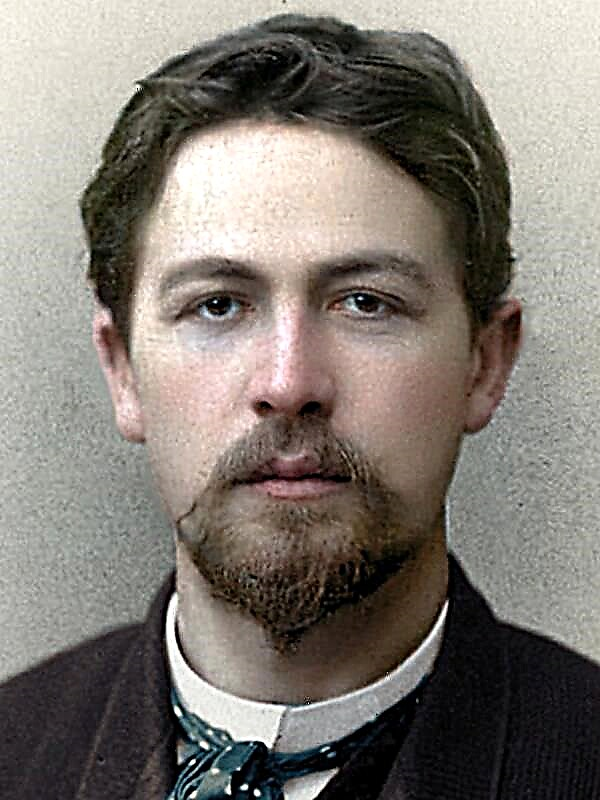
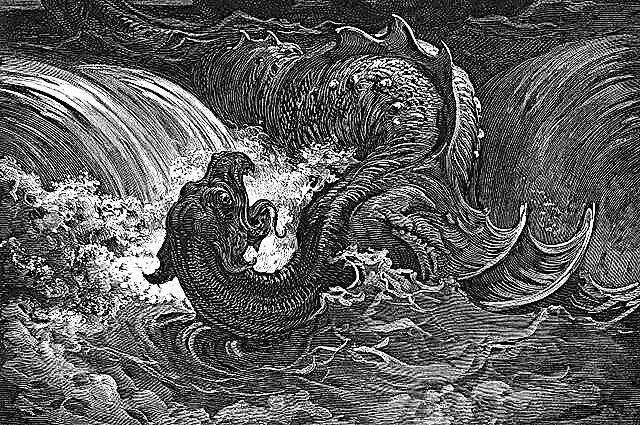
 Clarissa
Clarissa